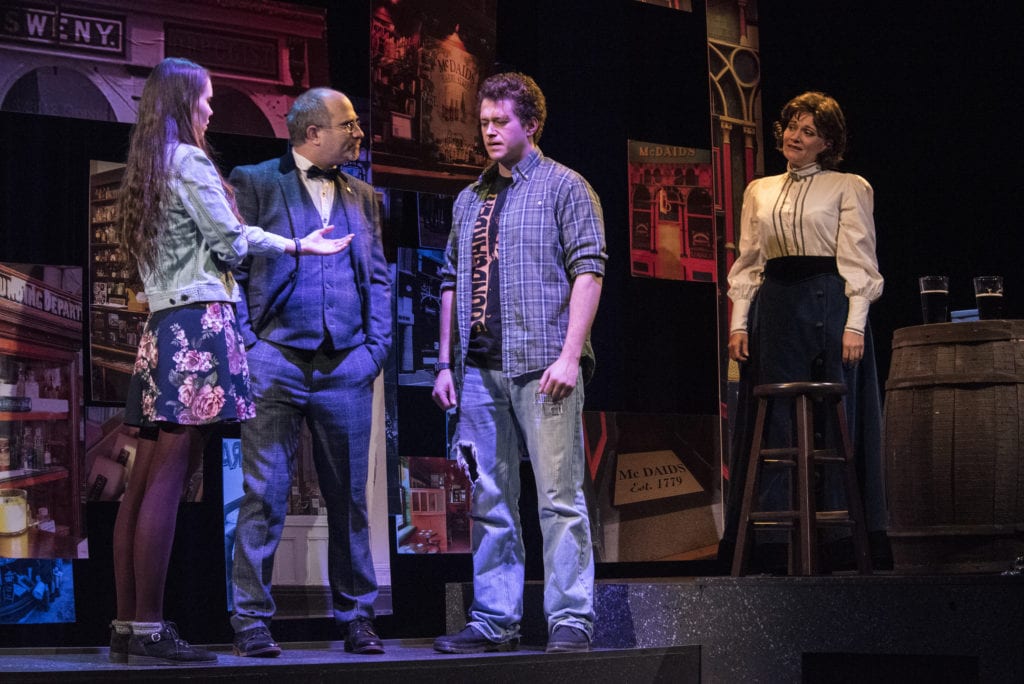
By Bob Bows, for ColoradoDrama.com (Read the original.)
While many have opened James Joyce’s heralded tome, Ulysses, only a small percentage of literati have read it cover-to-cover. Yet, it continues to be cited as one of the greatest novels ever written. Part of the difficulty for many readers is its modernist style, which epitomizes what became known as stream-of-consciousness.
Much to our delight, playwright Steven Dietz’ sweet love story emulates Joyce’s fluid approach to time, as well as his seamless mix of memory and dreams, drawn from Joyce’s take on Freud’s and Jung’s work. It’s no coincidence that one of the most famous interpreters of the wired revolution, Marshall McLuhan, was a Joycean scholar.
We are in Dublin in early June, a few days before Caithleen (Kate Parkin) met Robbie (Peter Bussian), 35 years before on Bloomsday, when they were 20. She was giving a tour of the stops that Joyce’s protagonist, Leopold Bloom, made that day, June 16th (chosen because it was the first date for Joyce and his future wife, Nora Barnacle). Robert (Justin Walvoord), now 55, recalls the moment, as he gazes upon the fair, young, Caithleen.
He has returned to Dublin from the states to meet Caith, again, after all these years; or, are both these narratives happening at the same time in space-time? This is a legitimate question to those who understand the implications relativity and uncertainty, which director Jada Suzanne Dixon astutely sorts out for us with sublime staging.
Robert, speaking in the present, looks upon Caithleen and recalls a remark she made to him 35 years earlier:
“Time is not a series of neat single notes called “the present”—one played after another.” No, to her Time is a chord: many notes, past-present-future, all real … all alive … and all played at once.
Set against a pastiche of images from the locales and shops that Bloom visited (set by Ron Mueller), Dietz cross-hatches and cross-fades layers of Robert’s and Caithleen’s past, present, and future into a stream-of-consciousness akin to the novel.
Joyce picked June 16th because romance was on his mind, and Parkin and Bussian bring the stage chemistry and sparks to illuminate and magnetize the budding romance between Caithleen and Robbie.
CAITHLEEN. But if you’ll have me … if you’ll truly have me … knowin’ what you know … I’ll get my things together. I’ve no one to say goodbye to. I’ll get my Ma’s blue suitcase. She wanted to take it when she left for St. Brendan’s but Da said to leave it be. Said it wasn’t really travelin’ where she was goin’. But with us, Robbie—it’ll be real travelin’, won’t it? If you’re not teasin’ me. Please don’t tease me. Tell me it’s real. Tell me you’re serious.
If you’re a hopeless romantic, it’s quite a jolt when the climactic moment in their young relationship arrives. As Robert, looking at Caithleen, now describes it:
It was then I realized that there is a … coldness in me. Masked—yes. Managed well—to be sure. But that night I knew … down deep, at the center of me … I am made of something cold. And I think that started here. In Dublin. With her. And I can’t tell her that.
Yet, memories of the affair drove him to become an expert on Ulysses, which he gets to share, 35 years later, with the young girl who doesn’t know him now. Surely, we’ve all had similar conversations with our past lovers and friends, muses and nemeses. What Dietz reveals about Caithleen and Robert in these scenes—Parkin vexed, Walvoord wistful—is the special sauce that sets up the separate romances that follow for each.
Before Robert (Walvoord) and Caith (Megan Van De Hey) meet again at McDaid’s Pub, where they first sat down, out of the rain, and had a pint, Robert and Caith separately visit with both their younger selves, Robbie (Bussian) and Caithleen (Parkin). These scenes delightfully reveal truths to both their young and old selves about themselves and the other … and we smile and nod, sure that this will change nothing.
Dietz embraces these contradictions and mutual frustrations: Walvoord relentless in his admonishments and advice to his younger self and Bussian impatient with the pushy old man; Van De Hey enigmatic as her questions prod Robbie to consider his actions and Bussian skeptical, then eager to hear—of Caithleen’s past, before he met her—from the wizened Caith; and finally, Van De Hey as soothsayer to her younger self, dispensing gems:
Every woman knows the future if she’s got the nerve to look! Aye, it’s a fact beyond dispute: women can see an older version of themselves walkin’ across the road an’ say, “Oh look what’s to become of me!”
Can you imagine a man sayin’ such a thing?! Not on your life! If a man saw his older self across the road, he’d say, “Thanks be to St. Patrick that I’m never gonna end up like that!”
To which Parkin, vulnerable, absorbs in a visceral way that underscores the advice.
Finally, at the denouement, Van De Hey and Walvoord share a series of poignant moments, pretending to each other that their younger selves aren’t embracing and kissing in parallel down stage, running space-time backwards and changing the script; or, is this just their imaginations running wild at thought? The answer from Ulysses and from this play is indeterminate; thus, in many ways, Joyce’s modernist art interprets Einstein’s Theory of Relativity (both the Special and General Theories were published prior to Ulysses) better than many scientists understand it. Consider Schrödinger’s cat and the possibilities of what Cait calls “shifting,” in which she experiences the past and present simultaneously, much as Robert learns to do; or, is that something Cait has conjured as well?
